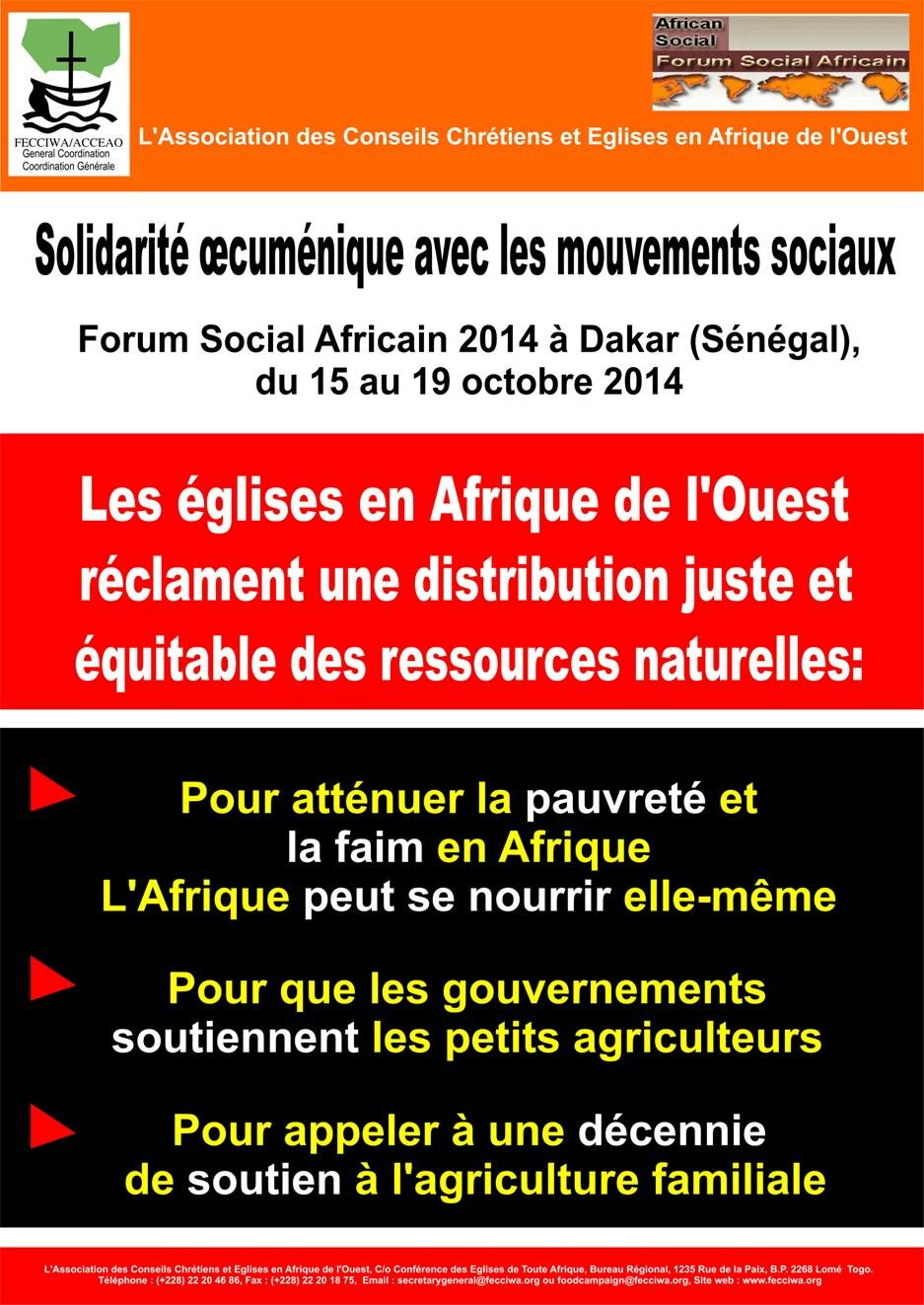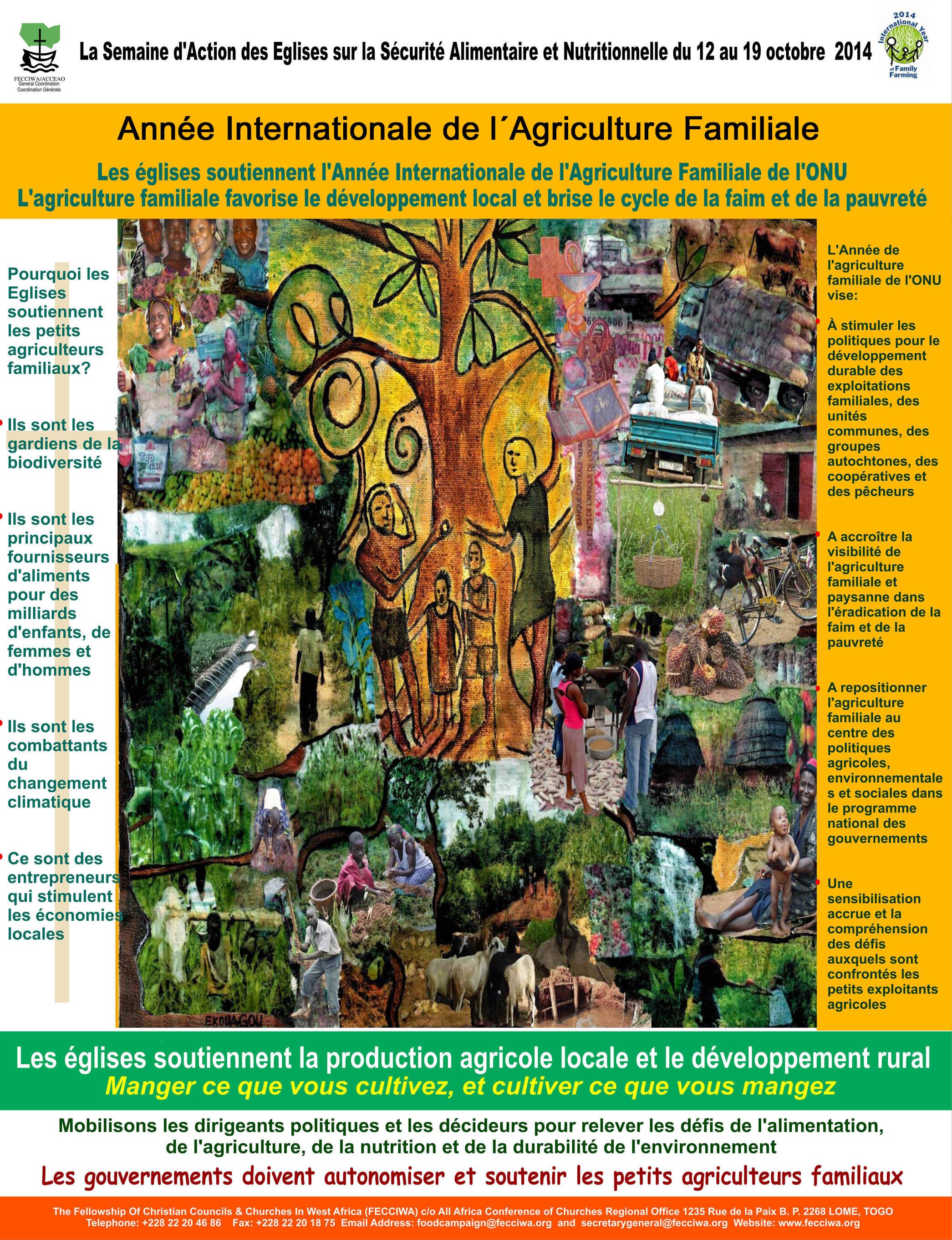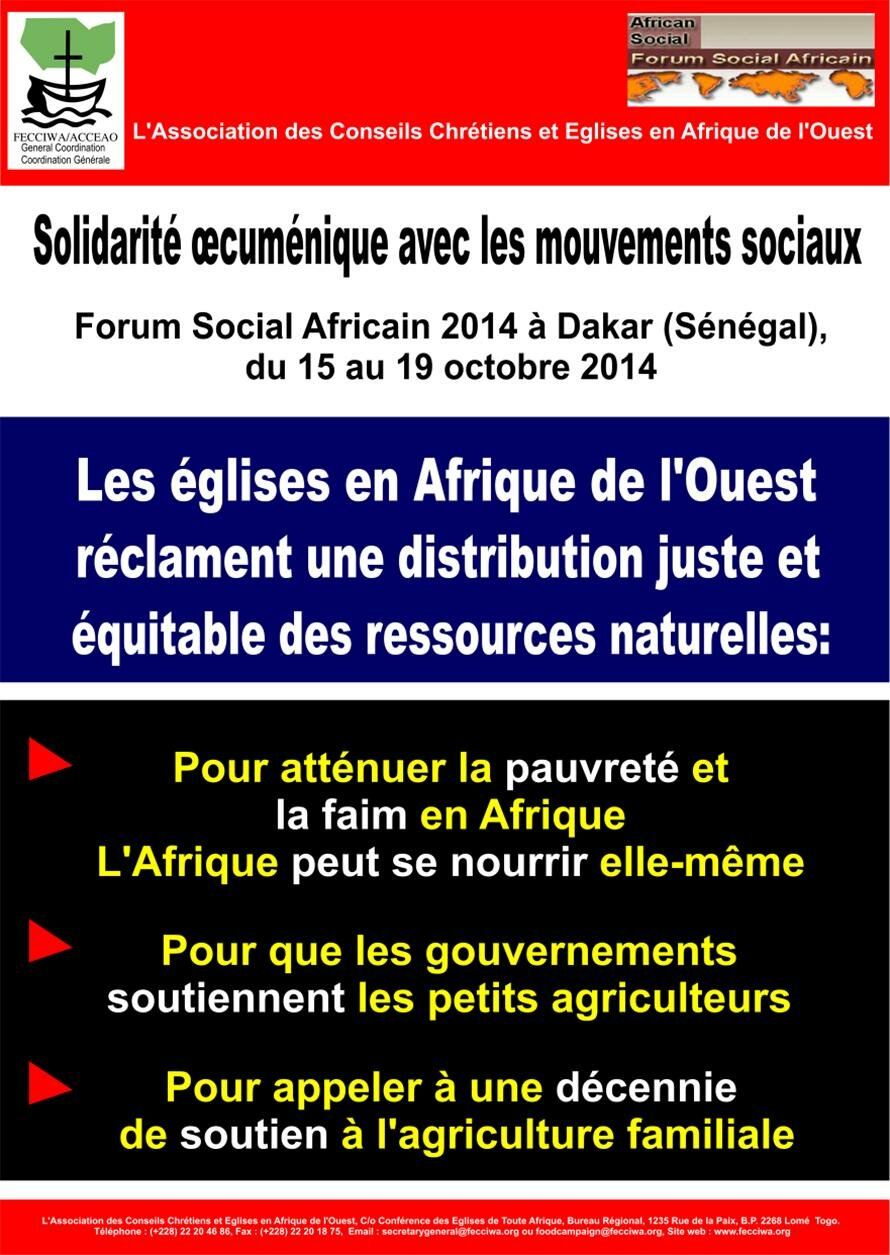West African Churches focus on “Seeds for Life” in order to overcome hunger and poverty in West Africa
From October 13 – 17, 2013 The Fellowship of Christian Councils and Churches in West Africa (FECCIWA) in collaboration with National Christian Councils and Churches joined millions of Christians worldwide in the celebration of the Global Week of Action on Food. Under this year’ theme “Seeds for Life” church leaders engaged local farmers, fisher folks, decision makers and the general public into worship services and public dialogue in order to overcome hunger and to improve livelihoods in harmony with creation. With a united voice during the week of action, church leaders in the region preached sermons and advocated for increased solidarity between consumers and local producers in the church’s fight against hunger and extreme poverty.
Speaking to a huge crowd of both religious and civil society leaders in Banjul, The Gambia, at the opening of a one day symposium on “Seeds for Life”, FECCIWA’s President, the Most Rev. Emmanuel Josiah Udofia said the “Food security should not be left in the hands of governments alone. FECCIWA and its member churches must come together to build awareness and speak out against hunger and social injustice. Churches are prepared and willing to accompany governments in order to make West Africa a better place for all.” The Most Rev. Udofia encouraged church leaders on World Food Day to sustain their efforts to building more equity, just and environmental friendly food systems to fight hunger and conflict.
His Grace, The Most Rev. Emmanuel Udofia and Mrs. Victoria Ginja , World Food Program at the World Food Day
symposium in Banjul, the Gambia
During the symposium, several eminent panelists welcomed churches’ engagement to build solidarity and help people break the cycle of hunger and poverty in the Gambia: Mrs. Victoria Ginja from the World Food Program of the Gambia proposed West African churches to join forces with her organization to defeat hunger and poverty in a region that has abundant natural resources. By the means of school feeding and educational programs, WFP fosters and promotes local food production and consumption patterns. Mr. Ernest Aubee, Senior Program Officer of the Directorate of Agriculture of the Economic Community of West African States (ECOWAS), appreciated the Methodist Church of Gambia for their engagement in improving the situation of poor communities in rural Gambia. Sharing on the ECOWAS initiatives in targeting regional agriculture and food security, Mr. Aubee welcomes FECCIWA's engagement to the same cause, for a strong integrated West African Agriculture.
Speaking further, nutrition experts Mr. Tumani Coorah of the Medical Research Councils of The Gambia reiterated the urgent need to reinforce just and healthy food consumption patterns, referring to the Methodist Mission’s Nutrition Center in The Gambia as an important institution. Equally present at the Seeds for life symposium in the Gambia, were dozens of representatives of fisher folks and farmer associations. They claimed collective efforts for the realization of the FECCIWA Food campaign‘s slogan “eat what you grow, and grow what you eat”, to which the Gambian government officially adheres:

During the open debates, local farmers in The Gambia lamented on how farmers have suffered in recent years. Mr. Faburama Fofana, National Coordinator of the National Alliance for Food Security in Gambia argued that their first cash crop - groundnut production - is dropping for various reasons: Yields are dropping, quality seeds are lacking as well as the knowledge to produce them. Climate change is affecting small scale food producers. The called for better and locally adaptable seeds, irrigation facilitates and credits to produce more locally and quality food to feed their nation.
“Why care about food security?”, “who has the responsibility to feed the people?”, “does the church have a role to play in enhancing food security?” these were some of the pertinent questions raised in during group discussions in Sierra Leone on the occasion of World Food Day 2013. Series of workshops and interactive discussions were organized by the Council of Churches in Sierra Leone to mobilize awareness in local communities on global food systems and their impacts in the lives of local producers and food processors. The Council of Churches in Sierra Leone (CCSL) led this national initiative to boost the involvement and participation of grassroots communities in crafting sustainable solutions to reverse worsening food insecurity trends in post war Sierra Leone. To stimulate the debate and give critical input on how to move out of food insecurity and achieve food sovereignty, CCSL and FECCIWA have produced a mini-documentary, in which food producers and church leaders described most pressing challenges and urged for solidarity economic amongst producers and consumers.

Workshop participants at Olivet Baptist Church in Freetown, Sierra Leone are
concerned about food insecurity in Sierra Leone
The Churches’ Week of Action held in Togo this year inspired churches to raise concern on local natural resource management, protection of local seeds, knowledge and biodiversity to guarantee food security for future generations. By the initiative of the FECCIWA and the Christian Council of Togo (CCT) the Togolese National Televised “Seeds of Freedom”, a revealing documentary on the agrochemical industries’ grip on global agriculture, which has threatened local peasants systems by the commercialization of seeds and inputs. Local congregations equally hosted pubic screenings of the film and held debates on “the state of seeds” in Togo. Opening the symposium on World Food Day, Reverend Eli Djarkononde, of the Christian Council of Togo, explained the choice of this year’s theme Seeds for Life: “The seed, essence of life is threatened. Recently man begins to genetically modify organs, but unfortunately, few people are aware of what is happening in the seed sector. Indeed, this change is irreversibly impacting plant biodiversity in the world. The loss of biodiversity will seriously jeopardize local farmers’ ability to adapt to climate change.” Dr. Akihila Djidjeira, Director of Seeds at the Ministry of Agriculture, Livestock and Fisheries emphasized the distinction which Togo had received for its engagement for reducing hunger and malnourishment by the United Nations Organization for Food and Agriculture (FAO). This honour, though encouraging, “must not shrink the dynamics that the Togolese have put into the agricultural sector, challenges us to be more effective for the full achievement of the objective and the sustainability of the expected results, especially in vegetable production, the value addition and promotion of agriculture products made in Togo."
Rev. Eli Djarkononde, CCT and Rev. Martine Zinsou-Lawson during coffee break with local food at the 2013 Celebration of World Food Day Symposium in Togo

Reverend Ankou Saram, agriculturalist, encourages church leaders, decision makers and civil society representatives to live and speak for change: “We must built awareness and call for Christian solidarity between consumers and producers in order to protect God’s creation and the needs of future generations.” According to Mrs. Claire Quenum, from the African Network for the Right to Food (ANoRF), lacking protection and value addition for local seeds, reveals a lack of real commitment by the state, which favored the promotion of foreign solutions, encompassing the promotion of high use of chemicals and the introduction of commercial seeds, genetically modified organisms included. She urges: “The Church has to be on the front line of a large movement to raise awareness on this tragedy and dangers for future generations to come. The church has to call on government officials, authorities and all actors in our churches to protect our biodiversity and built systems of sustainable food sovereignty." For Mrs. Philomena AMOUZOU, National Food Security Campaign Coordinator of the Christian Council of Togo, the situation of rural women is of a growing concern, as they face many difficulties to access means of production. "We must stand together with our wives. The church must help, raise awareness and motivate to add value to natural seeds to avoid the dangers associated with the use of commercial seeds, GMOs and chemicals."
Screening of the film “Seeds of Freedom” with women in a local Parish in Togo









